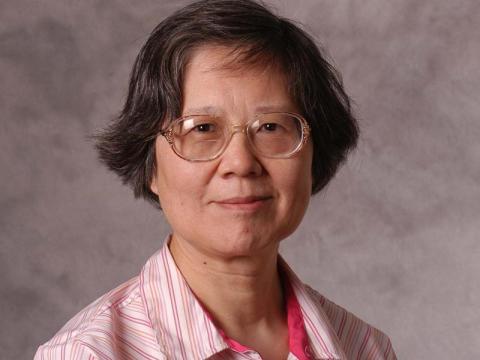
Rensselaer Polytechnic Institute Physics Professor Gwo-Ching Wang has been elected as a fellow of the Materials Research Society for “for seminal contributions to the fundamental understanding of surface and thin film ordering using electron diffraction and the invention of electron pole figure technique for growth front texture analysis.”
“Throughout her career, Gwo-Ching Wang has made many significant contributions to the fundamental science of thin film materials and characterization, to the extent that future thin film technology will benefit from the knowledge of interface and surface of these materials gained from her group’s work,” said Curt Breneman, dean of the School of Science. “We congratulate her on this honor, and we are very proud to have her as a colleague.”
Fellowship in the Materials Research Society (MRS) honors members who are notable for their distinguished research accomplishments and their outstanding contributions to the advancement of materials research, worldwide, according to the MRS. The maximum number of new fellow appointments each year is limited to 0.2 percent of the current MRS regular membership. Thus, the distinction is highly selective.
The society will recognize the class of 2017 MRS Fellows in April, at the 2017 MRS Spring Meeting and Exhibit in Phoenix, Arizona.
Wang’s recent research focuses on developing new materials for solar cells. In particular, Wang is developing thin film materials with high optical absorption in the visible solar spectrum such as tin sulfide and cadmium telluride. The Wang research group discovered a simple method for growing tin sulfide and tin disulfide semiconductor films with ideal properties for high-efficiency solar cells, and was able to tune bandgap during film growth. In future research, they will be working to optimize film growth conditions and interface quality, identifying any key performance limitations and key areas of improvement.
A native of China who grew up in Taiwan, Wang joined Rensselaer’s Physics Department as an associate professor in 1984, after working for four years at Oak Ridge National Laboratory in Tennessee as a staff scientist in the solid-state physics division. Wang earned her bachelor’s degree in physics from Cheng‐Kung University, Taiwan, her master’s degree from Northern Illinois University, and her doctorate in material physics from the University of Wisconsin‐Madison.
Wang’s research is enabled by the vision of The New Polytechnic, an emerging paradigm for higher education which recognizes that global challenges and opportunities are so great they cannot be adequately addressed by even the most talented person working alone. Rensselaer serves as a crossroads for collaboration — working with partners across disciplines, sectors, and geographic regions — to address complex global challenges, using the most advanced tools and technologies, many of which are developed at Rensselaer. Research at Rensselaer addresses some of the world’s most pressing technological challenges — from energy security and sustainable development to biotechnology and human health. The New Polytechnic is transformative in the global impact of research, in its innovative pedagogy, and in the lives of students at Rensselaer.
About Rensselaer Polytechnic Institute
Rensselaer Polytechnic Institute, founded in 1824, is America’s first technological research university. For nearly 200 years, Rensselaer has been defining the scientific and technological advances of our world. Rensselaer faculty and alumni represent 85 members of the National Academy of Engineering, 17 members of the National Academy of Sciences, 25 members of the American Academy of Arts and Sciences, 8 members of the National Academy of Medicine, 7 members of the National Academy of Inventors, and 5 members of the National Inventors Hall of Fame, as well as a Nobel Prize winner in Physics. With 7,000 students and nearly 100,000 living alumni, Rensselaer is addressing the global challenges facing the 21st century—to change lives, to advance society, and to change the world. To learn more, go to www.rpi.edu.